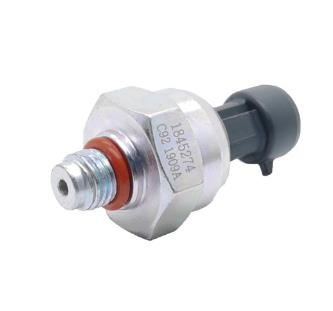Oil pressure sensors may not be the most glamorous topic, but they play a crucial role in keeping your engine running smoothly. In this article, we'll explore what oil pressure sensors are, discuss their advantages, and even touch on aluminum oil pressure sensors.
What are oil pressure sensors
Oil pressure sensors are essential components of an engine's lubrication system. They are responsible for monitoring the oil pressure within the engine and providing valuable feedback to the vehicle's computer system. By measuring the force at which oil is being circulated, these sensors help ensure that there is sufficient lubrication throughout all moving parts.
Located in various points of the engine, oil pressure sensors are typically connected to a gauge on your dashboard or a warning light that alerts you if there's an issue with low oil pressure. This information allows you to take immediate action and prevent potentially catastrophic damage to your engine.
So how do these sensors work? Well, they rely on a diaphragm mechanism that reacts to changes in oil pressure. When there is high oil pressure, the diaphragm compresses, sending an electrical signal to the computer system. Conversely, when there is low oil pressure, this mechanism expands and sends a different signal alerting you of potential problems.
Without functional oil pressure sensors, it would be nearly impossible to know if your engine has adequate lubrication or if something is amiss internally. These small devices serve as early warning systems and can save you from costly repairs down the road.

Advantages of oil pressure sensors
Oil pressure sensors are essential components in any vehicle's engine system. They play a crucial role in monitoring the oil pressure and ensuring that it remains within safe operating limits. These sensors provide valuable data to the engine control unit (ECU), allowing it to make real-time adjustments for optimal performance.
One of the main advantages of oil pressure sensors is their ability to detect potential issues before they become major problems. By continuously monitoring the oil pressure, these sensors can alert drivers or technicians if there is a sudden drop or increase in pressure, indicating possible leaks, clogs, or other malfunctions. This early warning system can help prevent costly repairs and breakdowns.
Another advantage of oil pressure sensors is their ability to improve fuel efficiency. When an engine operates with low oil pressure, it tends to work harder and consume more fuel than necessary. By accurately measuring and maintaining proper oil pressure levels, these sensors ensure that the engine runs efficiently, saving both money and reducing environmental impact.
Additionally, oil pressure sensors contribute to overall safety on the road by helping drivers avoid catastrophic failures due to loss of lubrication. Without sufficient lubrication from adequate oil pressure, vital parts of the engine may suffer excessive wear and tear or even seize up completely.
How about aluminum oil pressure sensors
Aluminum oil pressure sensors have become increasingly popular in the automotive industry due to their unique advantages. One of the key benefits of using aluminum instead of other materials is its lightweight nature, which helps reduce overall vehicle weight and improve fuel efficiency.
Moreover, aluminum oil pressure sensors offer excellent resistance to corrosion and wear, making them highly durable and long-lasting. This is particularly important as these sensors are constantly exposed to harsh conditions such as high temperatures and pressure within the engine compartment.
Another advantage of aluminum oil pressure sensors is their ability to provide accurate readings even under extreme operating conditions. They are designed to withstand high levels of vibration and shock without compromising their performance or accuracy.
Furthermore, aluminum has good thermal conductivity properties, allowing for efficient heat dissipation. This ensures that the sensor operates effectively by preventing overheating, which could affect its readings.
Aluminum oil pressure sensors offer a reliable and cost-effective solution for monitoring engine performance. Their lightweight design, durability, accuracy, and thermal conductivity make them an ideal choice for modern vehicles.

Conclusion
Oil pressure sensors play a crucial role in monitoring the oil pressure of your vehicle's engine. These sensors provide real-time data that helps to ensure optimal performance and prevent any potential damage. Whether it's for safety reasons or to improve efficiency, having an oil pressure sensor installed is definitely a wise decision.
DJTech Co.,Ltd. was established in 2017 in Shenzhen . It is an advanced sensor system integrator in China that integrates data, software and services. Its product business covers agriculture ,industry (Oil, chemicals, coal ), medical, smart home,environmental monitoring ,Geological disaster prevention industry, the railway industry, consumer electronics fields. DJTech Co.,Ltd.has professional R&D engineer to research variety of low-power sensors,includingInclinometer, Pressure sensor,Temperature sensor,Infrared sensors,Gas sensor,Waterlogging sensor. It provides customers with cost-effective solutions.We have advanced production equipments , testing equipments and R & D equipments, our products passed ISO9001:2008 in succession.
High quality compact digital pressure transmitter manufacturer-DJTech
Pressure measuring and control equipment-normal pressure transmitter
Pressure sensors aimed at medical ventilators-DJ technology supplier
Waterproof absolute pressure sensor will be available for 10 years
A pressure sensor for operating temperatures up to 900°C
https://www.dejintech.com/Important-part-of-engine-lubrication-system-oil-pressure-sensors.html



